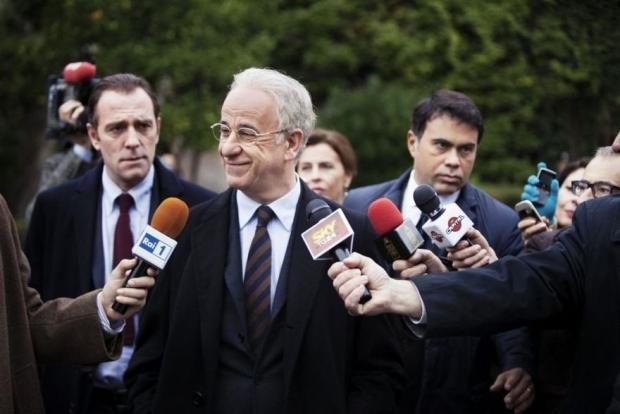Film review: Viva la Liberta
If any present-day nation deserves to have its politics satirized, Italy must be near the top of the list. The country often seems never to have achieved full nation-state status since Garibaldi’s nineteenth-century uprising. It more resembles a fractious, unwieldy amalgamation of regions and big, entrenched interests: the mafia, the Church, north vs. south, etc. Former prime minister and felon Silvio Berlusconi, a kind of cross between Donald Trump, George Steinbrenner and Don Corleone—actually, no American comparison does him justice—and the people who put him into office invite amused scrutiny.
Which you won’t find in Roberto Ando’s Viva La Liberta, despite its ostensible setting in Italy’s national political scene. Ando has instead opted for a whimsically humanistic approach. His movie’s premise involves the political stasis and popular dissatisfaction in the country, but their use only amounts to a plot device to initiate things, not any reflection on anything specific or real. The film’s conceit is a very old one: The confusion or swapping of one person for an identical twin, related or not. It’s been used by novelist Alexander Dumas in The Main in the Iron Mask, Chaplin in The Great Dictator, his ill-timed sendup of fascism and the 90s American presidential comedy Dave, to name a few
Here, the two are long-estranged identical twins, Enrico and Giovanni (Toni Servillo), the former a federal senator and the leader of the leftist opposition in the parliament. On the eve of an important party meeting and a national election, he takes a powder, leaving officials, members and his calmly adept aide Andrea (Valerio Mastandrea) in the lurch. A solution seems at hand when Enrico’s wife Anna (Michela Cescon) tells Andrea of an unknown brother, who’s just been released from a psychiatric institution with a bottle of prescribed medicine.
Giovanni, previously a published philosopher, graciously receives Andrea and his proposition: pose as his brother as the party prepares for the election. Meanwhile, a spiritually depleted Enrico has gone to ground at the Paris apartment of an old girlfriend and her family, decompressing and ruminating on his life. Back in Rome, Giovanni is making political hay, intriguing the political establishment with his disconcerting but charming eccentricities, and inspiring popular interest and support with his declarations challenging conventional rhetoric and assumptions (for example, the Italianate rendering of the FDR-like “Fear is the music of democracy”).
In Ando and Servillo’s portrayal, Giovanni is a sort of strangely shrewd holy fool, or perhaps the wise madman who penetrates the petty subterfuges and twisty motives of others. Servillo is a smoothly agile actor and his graceful performance gives the movie most of what modest resonance it has. Ando must have intended a sly but warmhearted and bittersweet little comedy, but the material is so coy, elliptical and sketchy that Liberta merely comes off as arbitrarily cute. Its characters and situations don’t add up to a coherent comedic tone or narrative.
Maybe a modern version of the great French – and sometimes American – humane director of the fantastic René Clair could have made something of this stuff, but Ando hasn’t measured up here.
Now playing at the North Park Theatre.

